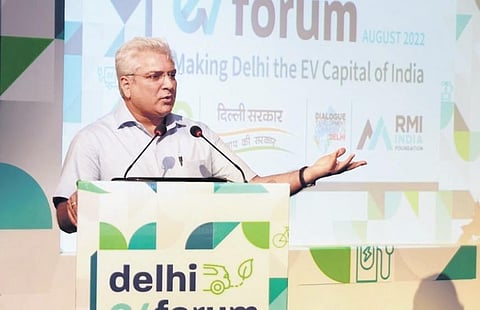

NEW DELHI: By 2025, the national capital must have 75 per cent of buses on the road to be electric-powered, Delhi transport minister Kailash Gahlot said on Monday, during an event organised by the Dialogue and Development Commission of Delhi (DDC) to mark two years of Delhi Electric Vehicle (EV) policy.
Jasmine Shah, the vice chairperson of DDC, said road transport is responsible for more than 90% of all carbon emissions within the transportation industry. “Delhi is engulfed in an ever-tightening grip of pollution with the transportation sector responsible for one-third of all PM 2.5 emissions, thus, it is extremely crucial to realise how essential it is for Delhi residents to adopt electric vehicles in order to rescue their city and their own health,” said Shah.
The Delhi government introduced the EV Policy in August 2020 as a significant step towards cutting down on the city’s pollution load, the largest chunk of which comes from vehicular emissions. The policy offers consumers subsidies and exempts them from paying registration fees and road tax, which Shah said has opened the door for developments in the transportation industry, EV adoption, and emission reduction.
“We have installed over 2,500 charging stations, 250 battery repair stations and 22 per cent of the new bus fleet is composed of electric vehicles. Currently, the electric car adoption rate is between 10 per cent and 12 per cent, which is way higher than the national average of 4%. The entire process of applying for subsidies under the EV policy is done online, making it simple and hassle-free,” said Gahlot.
When asked about the future of the EV policy, Gahlot said that the Delhi government is “proactively striving” for a 25 per cent EV penetration commitment for taxis over the next two years. Furthermore, we are announcing a three-year coordinated action plan that will see the installation of additional 18,000 charging stations by 2024 to ensure that there is one station for every 15 electric vehicles in the city,” said Gahlot.
Delhi to have one charging point for every 15 EVs by 2024
The Delhi government’s charging plan for electric vehicles has incentives for battery swapping facility operators and one public charging point for 15 EVs by 2024, a new policy document has said. The government will also have the power distribution companies, or the discoms, studying the impact of EV charging on the grid.Delhi government on Monday released the charging ‘action plan’ for electric vehicles on completion of two years of its EV Policy that was first launched in 2020.